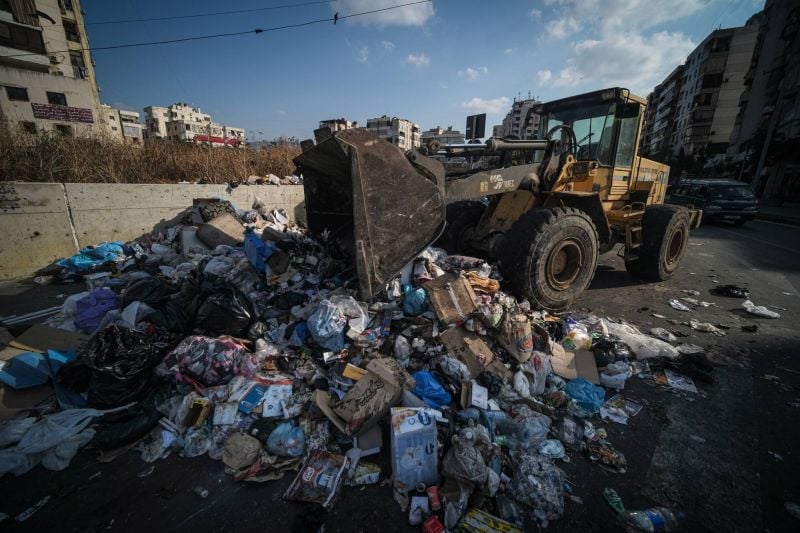
An excavator drops off household waste on a street in Lebanon. (Credit: João Sousa/L'Orient Today/File photo)
Few things are going right when it comes to environmental protection in Lebanon. Forests decimated by chainsaws, entire regions threatened by desertification, water shortages, waste piling up in landfills and surging air pollution are just a few concerns.
All these problems are exacerbated by a lack of clear public policy and a blatant laissez-faire attitude by authorities.
L'Orient Today looks at five major ecological issues that require urgent attention in Lebanon.
1. Rampant Deforestation
Illegal logging, which has wounded the Lebanese landscape for decades, reached new heights with the economic crisis of 2019. Without regulations, or a body to maintain and uphold them, whole swathes of forests were razed in Akkar, southern Lebanon, Kesrouan, and the Bekaa in recent months to feed an illegal firewood market.
This practice has “unfortunate consequences for the climate,” according to Paul Abi Rached, the director of NGO Terre Liban. Rached says the latest instance of massive deforestation occurred in the Qadisha Valley in northern Lebanon, a UNESCO World Heritage site.
“Under the pretext of pruning oaks, hundred-year-old trees have been decimated. A two-and-a-half-kilometer-long road was also cut through the valley," Rached says. He accuses the Saint Antoine-Kozhaya convent, which appeared to have obtained an official document for trimming some branches, of having caused this ecological disaster. Convent officials did not respond to requests for comment.
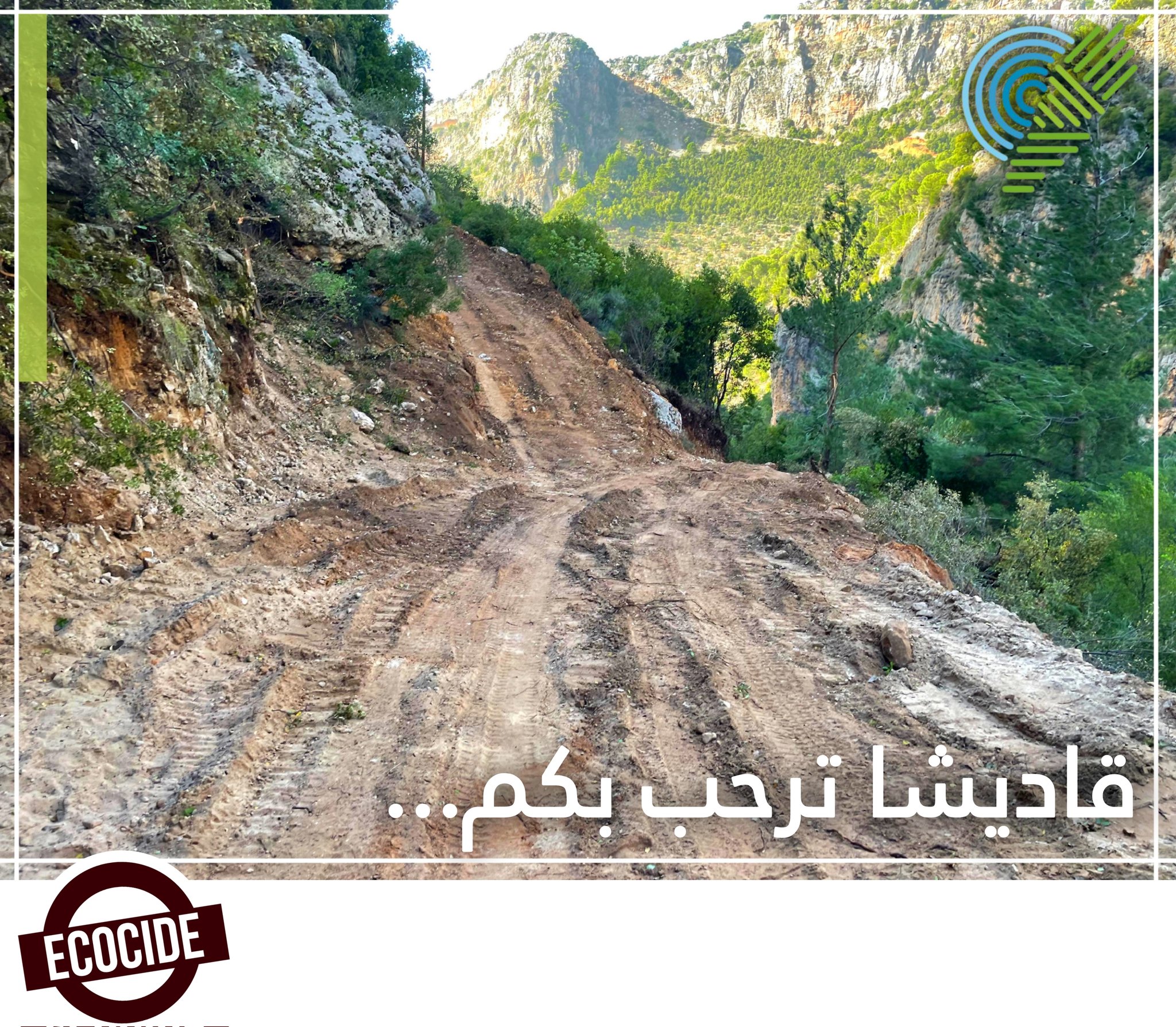 View of the landscape devastated in the Qadisha valley, in northern Lebanon, which is listed as a UNESCO World Heritage Site. (Courtesy of: Terre Liban)
View of the landscape devastated in the Qadisha valley, in northern Lebanon, which is listed as a UNESCO World Heritage Site. (Courtesy of: Terre Liban)
Rached sees Lebanon as “the forest of the Middle East." And yet, he adds, only 10-12 percent of Lebanon is today covered in greenery. "If deforestation continues here, the repercussions will affect the whole region, especially in terms of access to water.”
Beyond the threat of chainsaws, forests also face wildfires. "Climate change is causing fires in previously untouched areas, and forest fires are becoming increasingly frequent," explains Georges Mitri, Director of the Land and Natural Resources Program at Balamand University.
And within the last two months, the Hamas-Israel war spread to Lebanon's southern border, where Israeli forces destroyed 500 hectares of forest using white phosphorus bombs during clashes with Hezbollah.
2. Desertification 'advancing by leaps and bounds'
Desertification is one of many consequences of global warming and is already being felt in the northern Bekaa Valley and parts of southern Lebanon, according to Ali Darwiche, President of the NGO Green Line. It’s a damaging trend that is "advancing in leaps and bounds," he explains.
"The soil is losing its natural characteristics because the rainy season has also changed. It rains a lot, then it gets really hot, so the water no longer has time to feed the water tables," says Darwiche. "The same goes for snowfalls, often followed by mild temperatures. The snow melts quickly and ends up in the sea, without having had time to feed the soil."
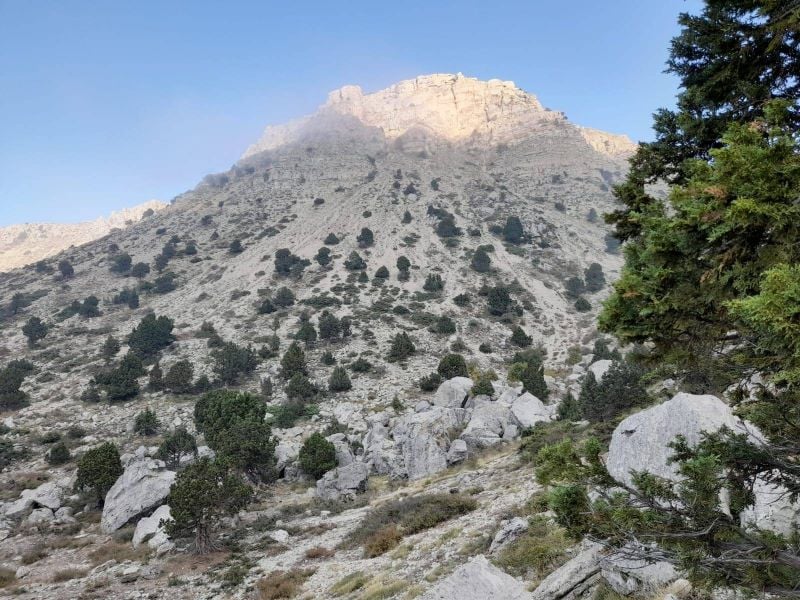 Increasingly treeless mountains, in the heights of Akkar. (Courtesy of: Hassan Zakaria)
Increasingly treeless mountains, in the heights of Akkar. (Courtesy of: Hassan Zakaria)
Darwiche also warns against changes in agriculture. "Many plants grown in Lebanon did not need irrigation before. This is no longer the case today, as rainwater that is normally retained in the soil evaporates much faster with the high temperatures we are experiencing,” he points out.
"Also, many insects not normally found in Lebanon have appeared as a result of climate change, and are now threatening certain tree species.”
All these issues intertwine, he adds. "Forest fires are aggravated by global warming. Fires affect the soil and can lead to desertification. It's a vicious circle."
3. Water shortages looming
Long described as a "water tower," Lebanon is now plagued by shortages.
"Global warming has led to the drilling of more and more artesian wells, whose water ends up mixing with that of the sea, creating a new problem of groundwater salinization," Darwiche explains. According to environmentalists, there are almost 60,000 illegal wells scattered throughout the country.
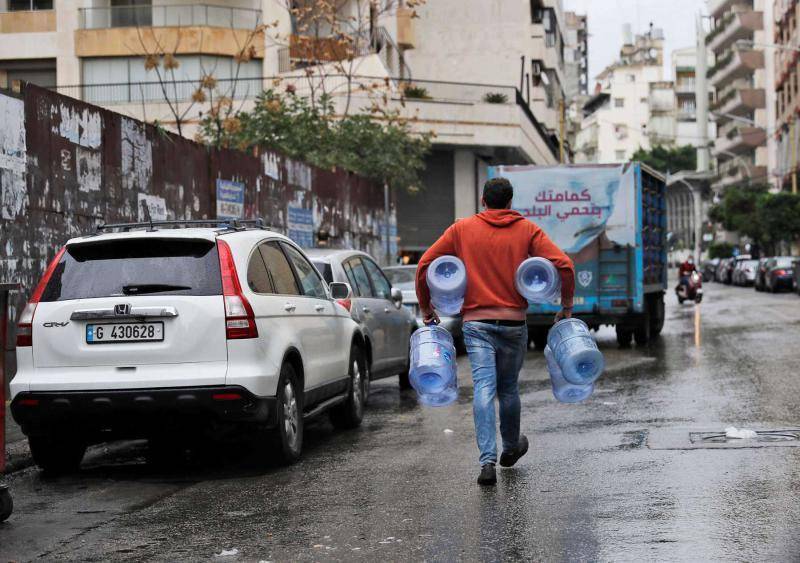 A man carrying empty water containers in a street in Beirut. (Credit: AFP/File photo)
A man carrying empty water containers in a street in Beirut. (Credit: AFP/File photo)
The frequency and quantity of rainfall in Lebanon is also a cause for concern. In early 2023, Abdel Rahmane Zawawi, head of the Weather Forecasting Department at Beirut International Airport, told L’Orient-Le Jour that "rainfall has generally been below average for the past two years."
Zawawi warned of a water supply problem should this trend continue and dismissed the influence of climate change on Lebanon's snowfall. "Climate change hasn’t really affected precipitation, but rather the minimum summer temperature, which in recent years has moved closer to the maximum temperature."
In late 2022, Greenpeace warned Lebanon, Algeria, Egypt, Tunisia, Morocco and the United Arab Emirates of a "very high risk of water shortages," with "repercussions on agriculture and human health."
4. The trash crisis
Household waste management is among the thorniest ecological issues in Lebanon. Apart from a few private recycling initiatives, most of the country's garbage ends up in coastal landfills, without any prior sorting.
A management plan was put in place in 2016 to address two large coastal landfills (those of Costa Brava, south of Beirut, and Burj Hammoud/Jdeideh to the north), but this plan was undermined by the financial crisis. Today, the two landfills are close to overflowing.
High amounts of methane were reported in these landfills, where everything is thrown into one big heap. "Methane is a greenhouse gas 25 times more influential on global warming than CO2," explains Charbel Afif, head of the Chemistry Department at Saint Joseph University (USJ) and an expert in air pollution.
In late 2021, methane emissions from the disused Naameh landfill, south of Beirut, were significant enough as to raise fears of an explosion.
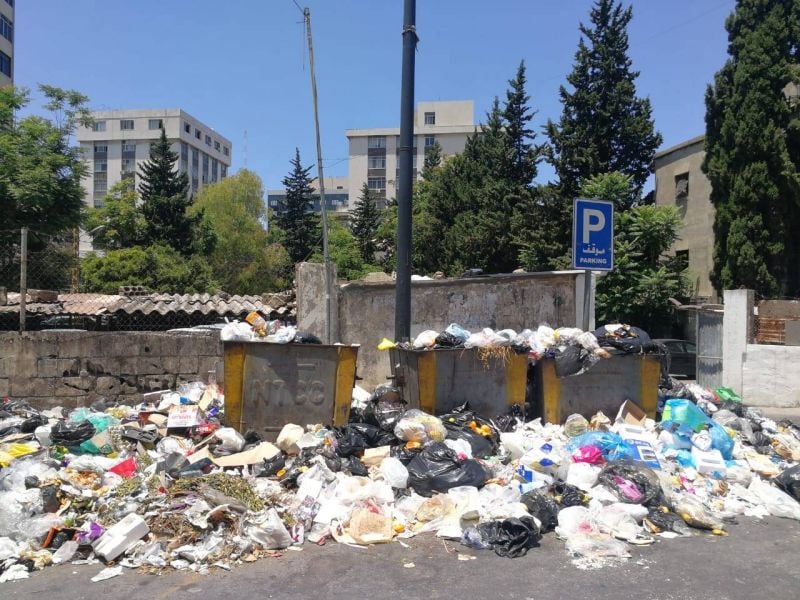 Overflowing garbage dumpsters in the streets of Saida. (Credit: Muntasser Abdallah/L'Orient Today/File photo)
Overflowing garbage dumpsters in the streets of Saida. (Credit: Muntasser Abdallah/L'Orient Today/File photo)
Ziad Abi Chaker, an engineer and leading "zero waste" advocate in Lebanon, denounces "a model that is perpetuated because it is lucrative, even though it has already proved that it doesn't work."
He accuses those with power of shirking responsibility. "Doing things in compliance with environmental standards is expensive, and the authorities don't want to invest in it."
Since the 1990s, the national waste management system has evolved very little. This is despite the traumatic effect of the 2015-2016 crisis that was triggered by the sudden closure of the Naameh landfill, the most important one in the country.
Successive plans for the Beirut and Mount Lebanon region (the country's most populous), were based on contracts with a limited number of companies, covering collection, street cleaning, waste treatment and disposal.
For the rest of the country, there are no real solutions, apart from a few controlled landfills and thousands of illegal dumps.
5. Unbreathable air
Air quality has steadily deteriorated for several years and is a serious public health issue in Lebanon.
Widespread use of private vehicles amid the absence of public transport, private generators in the absence of government electricity and open-air waste incineration in the absence of a proper waste management program all contribute to saturating the air with toxins.
Several studies carried out in 2023 by Charbel Afif and his team at USJ on air pollution in Beirut, Zouk Mikael and Chekka show that the air contains six times more suspended particles than the average permitted by the World Health Organization (WHO). "The average annual value allowed by the WHO is five micrograms of fine particles per cubic meter," Afif explains.
"In Lebanon, however, we have an annual average of 29 to 33 micrograms of suspended particles."
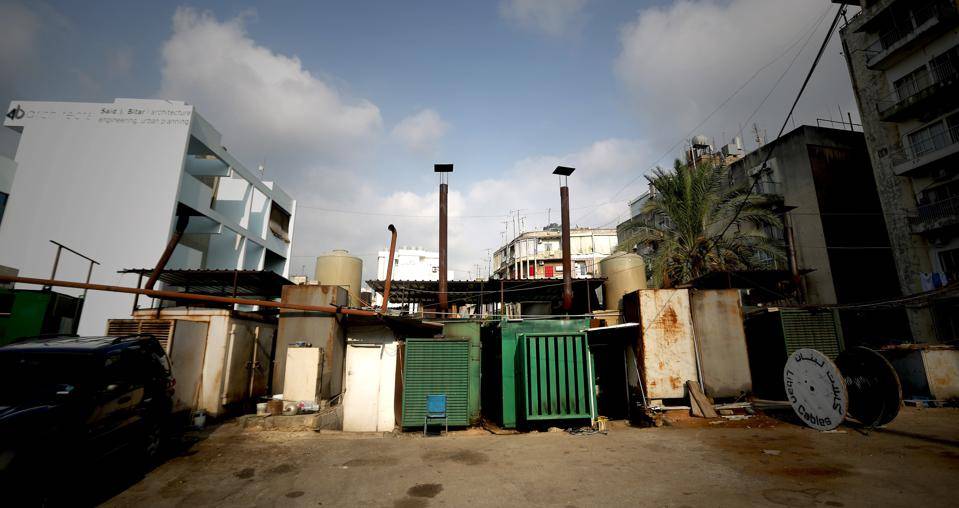 A collection of private generators in a district of Beirut. (Credit: AFP/File photo)
A collection of private generators in a district of Beirut. (Credit: AFP/File photo)
Private generators pose one of the most dangerous threats to respiratory health. "Generators emit ultra-fine particles that are highly toxic and can penetrate even further into the lungs," he warns.
According to Afif, Lebanon is unlikely to affect global warming, as it is not a major emitter on the world scale. But Lebanon is causing itself enough problems, since “it is the local air quality that is likely to become more degraded,” as toxic emissions persist.
A study carried out in 2021 by MP and AUB lecturer Najat Saliba and her students estimated that, with generators operating almost 24 hours a day in certain neighborhoods, the level of carcinogenic pollutants has increased by 300 percent, causing medical expenses to increase by at least $8 million.
This article was originally published in French in L'Orient-Le Jour.